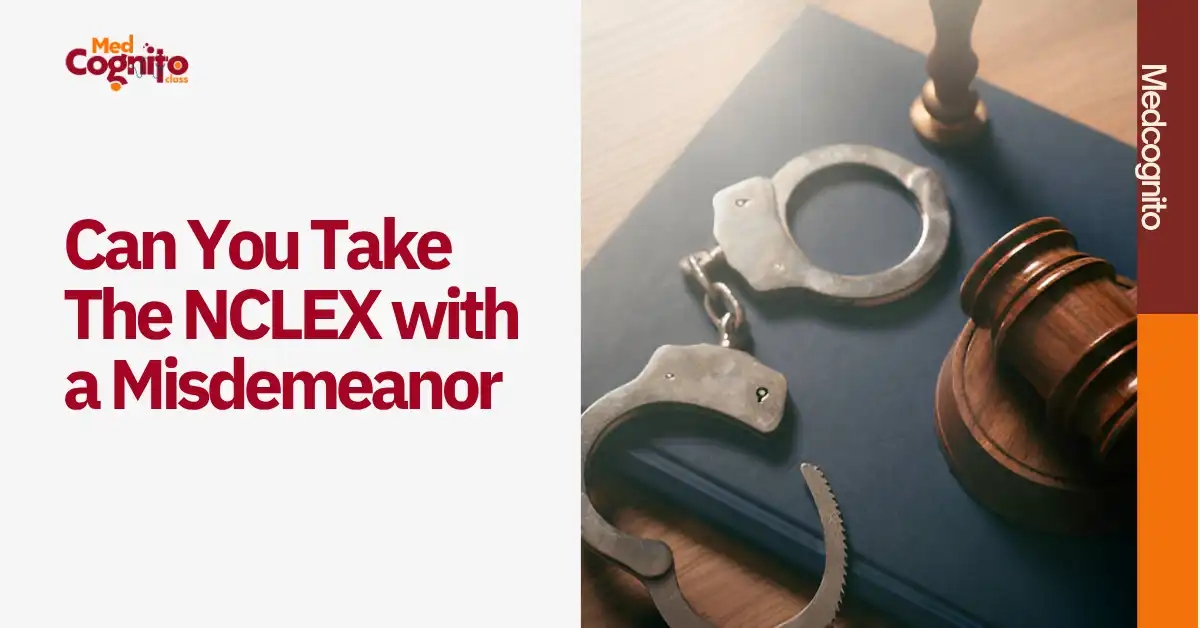“I made a mistake. Does that mean I can’t become a nurse?”
It’s a question whispered in online forums, murmured in anxious counseling sessions, or typed with trembling hands into a search bar by future nurses across North America.
If you’ve worked hard to pursue a career in nursing but have a misdemeanor on your record, you’re not alone, and you’re not necessarily out of the running.
Let’s unpack the reality.
Table of Contents
ToggleThe Short Answer: Yes, You Can Take the NCLEX with a Misdemeanor
Having a misdemeanor on your record does not automatically disqualify you from writing the NCLEX or becoming licensed as a nurse in the U.S. or Canada.
But, and it’s a big but, the process becomes more complex.
Both nursing schools and licensing bodies may scrutinize your record, and whether you move forward depends on the type of charge, how long ago it occurred, what you’ve done since, and which state or province you’re applying in.
Let’s break this down in practical terms.
Can You Get Into Nursing School With a Misdemeanor?
Some schools will consider your application on a case-by-case basis, while others might outright reject candidates with certain charges, especially recent or serious ones.
Clinical rotations can become a barrier. Even if you’re accepted into school, clinical sites often do their own background checks. If they deny you access, you may not be able to complete your program even if you’ve passed every test.
Key Factors Schools Consider:
- Nature of the offense: A 5-year-old shoplifting charge is different from a recent assault.
- Time since the incident: Juvenile or distant past offenses tend to carry less weight.
- Pattern vs. one-time event: One mistake is more forgivable than repeated issues.
- Evidence of rehabilitation: Letters, community service, therapy, or sobriety programs matter.
Can You Take the NCLEX With a Misdemeanor?
In most states and provinces, yes, you can still take the NCLEX.
However, the real gatekeeper isn’t the NCLEX exam itself; it’s the licensing board. Every nursing regulatory body performs a criminal background check during the licensing process.
In California, for example, misdemeanors less than 7 years old trigger an automatic review by the Board of Registered Nursing’s Enforcement Division.
Be prepared for:
- A longer application timeline
- Requests for documentation (court records, rehab program completion, etc.)
- Possible interviews or formal reviews
Important: Some states don’t ask about criminal records on the application, but will still check them via fingerprinting or national databases. Don’t assume silence equals safety.
What Kinds of Misdemeanors Raise Red Flags?
Nursing boards prioritize public safety and professional integrity. So the nature of your offense matters more than the label “misdemeanor.”
Charges that often raise concerns:
- Assault or domestic violence
- DUI or substance-related offenses
- Theft or fraud
- Sexual misconduct
- Failure to report abuse or neglect
These types of misdemeanors raise doubts about your fitness to care for vulnerable patients or uphold the trust the profession demands.
What Happens If the Board Reviews Your Case?
When your application is flagged, it may go to a special enforcement or disciplinary division. Here’s what might happen:
| Outcome | What It Means |
| Approved without restrictions | You’re in the clear. Welcome to nursing. |
| Approved with probation | You’re licensed, but with strict conditions (e.g., supervision, drug testing). |
| Denied | You’ll receive a written reason and may be able to appeal. |
Pro Tip: Hiring a nursing license defense lawyer can significantly improve your chances of getting licensed without probation, especially if your charge involves substance use or patient safety concerns.
Real Nurses, Real Stories
On Reddit’s r/StudentNurse forum, dozens of nurses have shared their stories:
- One nurse with a past DUI was approved after completing an alcohol education course and submitting a personal statement.
- Another, who had a shoplifting charge at 19, was approved with no restrictions after showing clean records for 7 years.
- Several applicants were told by boards to wait a year or two longer before reapplying, emphasizing the importance of time and rehabilitation.
Lesson? Your story matters. So does your growth.
What If You’re Denied in One State?
Not all hope is lost.
Licensing is handled state by state (or province by province). A denial in one jurisdiction doesn’t mean you’re banned everywhere. Some applicants with records have had better luck applying in:
- States with shorter background lookback windows
- States that allow provisional or restricted licenses
- Jurisdictions open to “evidence of rehabilitation”
You may also explore nursing-related fields like health administration, medical transcription, or case management while reapplying.
Honesty Is Non-Negotiable
Never attempt to hide or downplay a charge. Boards often have access to national criminal databases, so omissions can be seen as dishonesty or fraud, which is much harder to overcome than a youthful mistake.
Instead, prepare:
- A written explanation of your charge
- Proof of rehabilitation (e.g., therapy, sobriety programs, community work)
- Character references from employers, educators, or clergy
A Misdemeanor Is a Hurdle, Not a Wall
You’ve made it this far.
You’ve studied. You’ve sacrificed.
You want to serve. Don’t let a past mistake define your future.
A misdemeanor doesn’t erase your capacity to heal, care, and advocate. It adds a layer of complexity but not impossibility to your journey.
Ready to Pass the NCLEX and Build a Better Future?
Let MedCognito walk with you. We specialize in helping international medical graduates and aspiring nurses succeed, no matter the path that brought them here.
Explore our NCLEX-RN prep course designed to maximize your score, minimize your stress, and fast-track your future.






